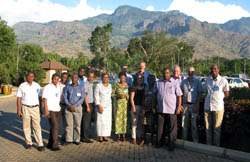|
After workshops in Ethiopia and Uganda earlier this year, Tanzania was the last country under the newcomers to be visited. On 6 and 7 November, a workshop was held in Morogoro, with the objectives of exploring the opportunities for extension of N2Africa to Tanzania, identifying suitable legume niches and developing a ‘roadmap’ for N2Africa activities in the country. The workshop was organized by Wageningen University and IITA, and participants ranged from government organisations (Ministry of Agriculture, Uyole and Naliendele Agricultural Research Institutes), to the Nelson Mandela Institute of Science and Technology, international organisations (USAID – Feed the Future, McKnight Foundation, Catholic Relief Services - CRS), and the private sector (Minjingu Fertiliser Company). |
 |
With such a broad spectrum of potential partners and a range of ongoing initiatives around legumes, the workshop started with an inventory of relevant projects currently taking place in Tanzania where N2Africa could link up. Next, the most important legume crops in Tanzania were identified, after which we discussed for which of these legumes the N2Africa project would be able to generate the largest potential for change. Jointly, soyabean, common bean (including climbing beans) and groundnut were selected as the major legumes for the initial stage of the project, while technical and agronomic support could be given to other projects on cowpea and pigeonpea. Geographically, N2Africa will focus on the Southern Highlands (with all three legumes) and on the Northern Highlands (especially for the introduction of climbing beans).
The second day of the workshop was centred on the development of a roadmap for N2Africa in Tanzania. For 2013, proposed activities included seed bulking, a baseline study (including rapid appraisals of the current role of legumes in farming systems, agronomic management practices, problems of soil fertility/ pests & diseases, etc.), establishment of partnerships with major NGOs for dissemination, and the start of participatory demonstration trials. A direct link was already established with the CRS project ‘Soya ni Pesa’ (Soyabeans are Money), which starts at the end of 2012 in the Southern Highlands of Tanzania. N2Africa will support this project by providing training on agronomy and inoculation (carried out by John Mukalama, CIAT Maseno) and secured the import of inoculants, so that commencing soyabean farmers can directly benefit from this technology.
We look back at a fruitful and inspiring workshop, which can best be summarized by the words of Dr Hussein Mansoor (Deputy Director of Research & Development, Ministry of Agriculture, Food Security and Co-operatives), said during his statements while closing the workshop: "Unlike most projects, you came with an open book and we have all designed this project together. The road map we have developed has come from our contributions. I thank you all for your inputs and we look forward to working together on this important initiative in the coming years".
And so do we!
Esther Ronner, Freddy Baijukya, Ken Giller
